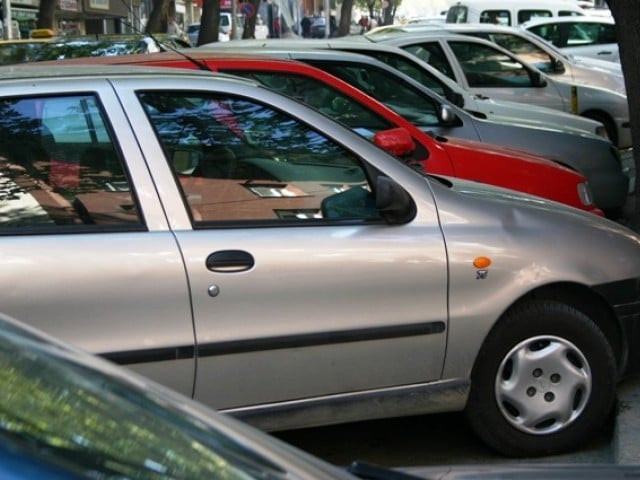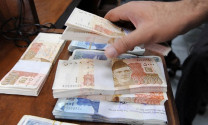Civic, Corolla and City cheaper than similar cars in India
Vehicle demand has risen to 2007 level, industry looking at future with optimism

Vehicle demand has risen to 2007 level, industry looking at future with optimism. PHOTO: FILE
Auto industries in China and India grew rapidly on the basis of consistently high GDP growth of 7% to 11% over the last 15 years.
One of the biggest casualties of economic mismanagement in Pakistan during the 2008-13 period has been the auto sector. Assemblers and parts manufacturers, who have invested billions to expand their capacities, had to face a 60% drop in demand from 2009 to 2011.
Gentlemen, start your engines : Auto show draws large crowds, fascinating cars
This led to the shutdown of four assemblers (Hyundai, Nissan, Chevrolet and Adam), causing massive layoffs and unemployment and huge losses to the surviving assemblers and parts manufacturers.
It is not true that Pakistan, by continuing to focus on import substitution, is producing old technology and fuel-inefficient cars. All cars made here, even those at the entry level, conform to at least Euro-II emission standards adopted by the government, if not higher.
Furthermore, most models are based on technologies and features similar to those in India, Indonesia or Thailand. Examples of such cars (using up to 60% local parts) include Honda Civic, Toyota Corolla, Honda City, Suzuki Swift, Suzuki WagonR, Faw Carrier and Faw XPV.
The automobile sector is one of the highly taxed industries in the country. Almost 35% of the vehicle price constitutes government taxes. This makes the government the biggest stakeholder in the growth of auto sector as it receives taxes worth Rs500,000 on a Honda City priced at Rs1.5 million.
On display : Vintage car lovers throng auto show
Net of taxes, the prices of cars in Pakistan are competitive compared to India despite volumes being 20 times smaller. For instance, Civic, Corolla and City are cheaper than their Indian counterparts, which shows the strength of local parts manufacturers to produce quality parts at lower costs, even with low volumes.
New players
It has been argued that new assemblers are not coming to Pakistan due to the requirements of localisation. The real reasons why they have not made investments are security concerns, unavailability of infrastructure especially power, no long-term policy, used car policy and its impact on existing assemblers, forcing four plants to shut down since 2008.

Now, due to the prudent policies of the government, the demand for cars has again reached the level achieved in 2007. The macroeconomic and security environment is improving and the industry is looking towards future with an optimistic outlook.
However, the industry that should have been at a demand level of 500,000 vehicles today, has lost eight precious years.
Incentives
The government is expected to offer much-needed incentives to new entrants in the upcoming auto policy. However, along with encouraging new players, the policy must also cater to increased investments from existing assemblers – Suzuki, Toyota, Honda and FAW – as well as auto parts manufacturers, who have a greater capability to invest in capacity expansion and introduction of new models at affordable prices.
Japan gifts 123 hybrid cars to aid police patrols
The fact is that all auto producing countries including India, China, Malaysia and Korea implemented policies to encourage localisation until they reached the critical threshold of 500,000 cars per year.
In case of Pakistan, the tariff-based system under the first Auto Industry Development Plan was hugely successful to ensure that local assemblers keep prices competitive through localisation of parts. As a result, all new models produced after 2008 have a high quantum of local parts of up to 65%.
Criticism
It is unfortunate that despite providing direct and indirect employment to over 2.5 million people, contributing to the development of a vibrant engineering sector and being the third largest contributor to government’s tax revenues, the auto assemblers and auto parts manufacturers have been at the receiving end because of false presumptions and anti-investment policy interventions encouraging the import of used cars.
For every job created at assembling plants, more than 80 jobs are created in parts manufacturing and many more in allied sectors.
The government should continue to closely interact with the industry stakeholders, especially parts manufacturers, who are the main driving force behind employment generation, technology acquisition and economic growth in the country.
The writer is a former chairman of the Pakistan Association of Automotive Parts & Accessories Manufacturers
Published in The Express Tribune, November 8th, 2015.
Like Business on Facebook, follow @TribuneBiz on Twitter to stay informed and join in the conversation.



















COMMENTS
Comments are moderated and generally will be posted if they are on-topic and not abusive.
For more information, please see our Comments FAQ